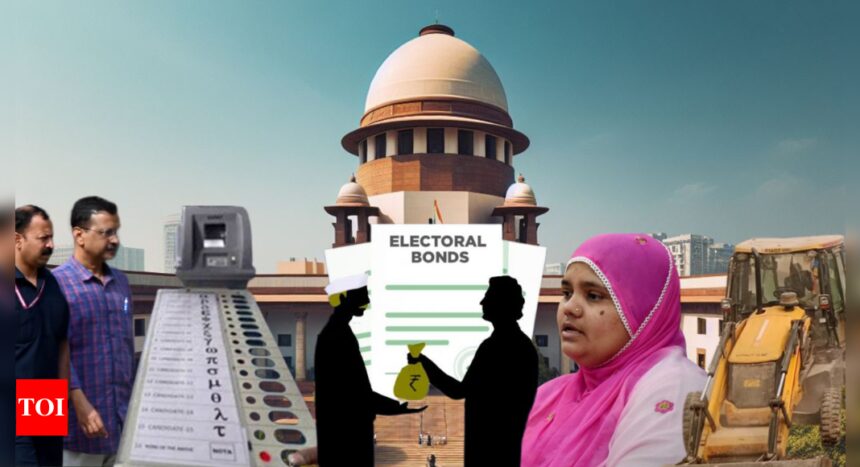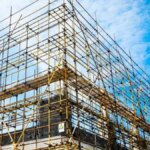In 2024, the Supreme Court of India made significant judgments that had a profound impact on the legal framework in the country. These landmark decisions addressed a variety of important issues, ranging from the rights of individuals to electoral transparency, thereby reshaping the judicial landscape.
### Key Supreme Court Judgments of 2024
#### Interim Bail for Election Campaigns
On May 24, the Supreme Court granted interim bail to Arvind Kejriwal, the former Chief Minister of Delhi, in relation to the Delhi Liquor Policy case. The court noted that Kejriwal had already spent considerable time in custody and allowed him 21 days of bail to participate in the upcoming Lok Sabha elections. Justice Sanjiv Khanna emphasized the necessity of balancing the rights of individuals with investigative needs, particularly in the context of the electoral process.
#### Strengthening Child Protection Laws
On September 23, the Supreme Court ruled that possessing, viewing, or storing child pornography is an offense under the Protection of Children from Sexual Offences (POCSO) Act, 2012. This decision overturned a previous ruling by the Madras High Court and underscored the significance of protections for children. The court also advocated for clearer terminology in legislation and urged Parliament to consider changing “child pornography” to “child sexual exploitative and abusive material” to better reflect the nature of these offenses.
#### Citizenship Act: A Split Verdict
In a landmark decision regarding Section 6A of the Citizenship Act, 1955, the Supreme Court upheld this provision, which grants citizenship to certain Bangladeshi immigrants in Assam. The ruling was contentious, with a 4:1 split among the justices. The majority argued that the provision was essential for maintaining Assam’s multicultural identity, while the dissenting opinion cautioned against its potential to perpetuate unchecked immigration.
#### Electoral Bonds Scheme Invalidated
On February 15, the Supreme Court unanimously struck down the Electoral Bonds Scheme. The court held that this scheme violated citizens’ right to information regarding political funding, a fundamental right under Article 19(1)(a) of the Constitution. It mandated transparency in electoral financing by ordering the State Bank of India to disclose all bond transactions since 2019 and required the Election Commission to publish this information.
#### Rescission of Remission for Bilkis Bano Convicts
On January 8, the Supreme Court nullified the remission orders that had released eleven convicts in the notorious Bilkis Bano gang rape case. The judgment emphasized victim rights and clarified the jurisdiction related to remission appeals, criticizing the Gujarat government’s actions as complicit in injustice.
#### Safeguarding Rights under UAPA
In a ruling on May 15, the Supreme Court stressed that individuals arrested under the Unlawful Activities (Prevention) Act (UAPA) must be informed of the grounds for their arrest in writing. This provision ensures that accused individuals can consult legal counsel, challenge their detention, and pursue bail, aligning the process with principles of fairness and justice.
#### Upholding Election Integrity
In a case concerning the integrity of Electronic Voting Machines (EVMs), the Supreme Court reaffirmed the current system’s reliability while allowing for limited Voter Verifiable Paper Audit Trail (VVPAT) verification. The court dismissed demands for complete VVPAT verification, citing logistical concerns, but introduced measures to enhance electoral transparency.
#### Protecting LGBTQ+ Rights
In a consequential habeas corpus ruling, the Supreme Court granted respect for individual autonomy in matters of same-sex relationships. The court ordered the appearance of an individual confined by familial constraints before a Family Court to express her wishes, reinforcing the rights of LGBTQ+ persons.
#### Preventing Illegal Demolitions
In September 2024, the Supreme Court addressed the issue of illegal demolitions, particularly affecting minority communities. The court established procedural safeguards to ensure that individuals are given proper notice and the opportunity for a personal hearing before any demolition takes place, emphasizing the right to shelter as a constitutional guarantee.
#### AMU’s Minority Status Affirmed
In a historic ruling, the Supreme Court overturned a long-standing precedent, recognizing that Aligarh Muslim University (AMU) could claim minority status under Article 30 of the Constitution. This decision clarified that institutions established under law could still hold minority status if they were founded by members of a minority community, thereby establishing new parameters for evaluating minority educational institutions.
These judgments reflect the Supreme Court’s ongoing commitment to upholding justice, protecting individual rights, and ensuring transparency in governance, demonstrating the judiciary’s role as a guardian of the Constitution.










